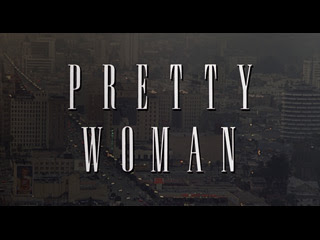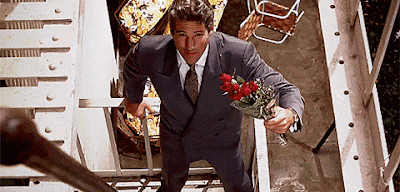Monday, March 23, 2020
Great Movies- Pretty Woman
Thirty years ago today, a dark drama about prostition titled "3,000" dropped on unsuspecting springtime audiences who just wanted to forget their troubles and escape reality for two hours. There's always an alternate reality when it comes to our favorite films, but rarely is it as pronounced as the sliding-doors moment that accompanies every behind-the-scenes retrospective of Garry Marshalls's masterpiece. This live-action Cinderella story morphed into a blockbuster crowd-pleaser that made every woman in America want to live vicariously through Julia Roberts, and I don't think the men in their lives objected too much. I don't know if her stroll down Rodeo Drive delighted as many people as Rocky Balboa running up those museum steps, but it's close. I remember having an awareness of this movie's popularity and impact, even as a Nintendo-loving ten year old. Let's talk in detail about the genesis of the ultimate romcom.
I don't want to say that Richard Gere was in a slump when he headed for Hollywood Boulevard in the summer of '89, but his last big hit was "An Officer An a Gentleman", and subsequent releases like "The Cotton Club", "Power", and "Miles from Home" didn't do the handsome 40 year old's career any favors. Seven years is a long time, and something had to happen fast. Enter Garry Marshall, the gregarious TV legend on a big screen roll, with the cable/VHS classic combo of "Overboard" and "Beaches". Al Pacino was his first choice to play Edward Lewis, the NY corporate raider with a soft spot for eager call girls. The "Scarface" star considered it, then did "Dick Tracy" instead(a year later, Al would make it up to Marshall with "Frankie and Johnny"). Christopher Reeve badly wanted the part, but as much as we love Superman, Gere was perfectly cast, as the inverse of Julian Kay in "American Gigolo".
'The King of Wishful Thinking' by British pop group 'Go West' nicely set the jubilant tone that Marshall was after, when he decided not to be 100% faithful to J.F. Lawton's script(more on that later). Vivian Ward's washboard stomach may have belonged to body double Shelley Michelle(she's also on the poster), but this happy hooker couldn't have been played by anyone other than Julia Roberts. Thank the movie gods that Molly Ringwald wasn't comfortable playing a prostitute. The smiling 21 year old star of "Mystic Pizza" and the soon-to-be-released "Steel Magnolias" delighted Marshall during a lengthy audition process, narrowly beating out perennial bridesmaid Diane Lane.
This movie wouldn't get made today. Twitter would never let Disney hear the end of it for producing a light-hearted fairy tale about the world's oldest profession. Vivian isn't a tortured soul, she's just a hot girl that doesn't want to wait tables. She's independent, she's having fun. Needless to say, life was a lot simpler in 1990. Would you give up 21st Century technology to NOT have to hear how problematic everything is? It seems like a fair trade.
Color me happy, you're going to hear a lot of love for Julia Roberts on this blog. She's beautiful, she's magnetic, she's energetic. It's thrilling to watch a young talent come to the forefront the way she does at the Beverly Wilshire Hotel(their penthouse suite was a studio set). Marshall rightly instructed Gere that his role was reactive, and his lack of ego about it really allowed her to shine in the first 30 minutes. Roberts really owned that room with her strawberries and "I Love Lucy" carpet party, and would subsequently own the '90s, with seven(non-franchise) films earning over a $100 million in the U.S. That won't ever happen again.
We have to talk about the supporting players, because a movie is never just about the main stars. Jason Alexander has talked about the fact that he wasn't wanted by Garry Marshall after his first audition. He was too short, too young(he was 29 at the time!), and just didn't fit what the director had in his mind for loathsome lawyer Philip Stuckey. Fortunately, a deal couldn't be made with anyone else, and with a production deadline fast approaching, Alexander got to be the villain in the fourth biggest movie of the year. Jason believes than a key endorsement from Marshall's people may have also gotten him "Seinfeld" that very same summer. Laura San Giacomo broke out in Steve Soderbergh's "Sex, Lies and Videotape" six months earlier, and steals her scenes as sassy sidekick Kit De Luca("Cinder-fuckin'-rella"). No small feat.
Is there room for one more in there? Edward interrupts a Prince song with a proposition. He needs a professional. After some playful negotiating, he gets Vivian for six days for $3,000. What a bargain. The only problem is, will he ever be able to let her go? I know I wouldn't.
Shopping is supposed to be fun. Vivian is having a good day, until she encounters some Beverly Hills elitism. Every dress she wants is "very expensive". She's obviously in the wrong place. Vivian's hooker garb gets her ejected from an upscale dress shop in a memorable scene that still resonates with anyone that's ever been instantly judged or made to feel like they don't belong. But this uptight bitch(Dey Young) work on commission, leading to a classic comeuppance.
Here's Hector Elizondo, the hotel manager and Vivian's unlikely ally. The tenured character actor has appeared in EVERY Garry Marshall movie, including the ones he didn't really want to be in. He definitely wanted to be in "Pretty Woman", because the quietly-kind-hearted Barney is arguably his best role, with all due respect to his TV work on "Chicago Hope" and "Last Man Standing". Our heroine has proper restaurant etiquette and a cocktail dress, courtesy of the cool concierge.
Edward takes his now-elegant escort to a business dinner with Ralph Bellamy, a recognizable, veteran actor whose career began in 1931. This was his final performance, and it's really cool that he got to go out in a film that the whole world saw.
There was a lot of improvisation on this set. Marshall really let his actors play and got some great stuff. This film wouldn't be half of what it is with rigid stars, total adherence to the script, and let's be honest, intimacy coordinators. That should be a lesson to future filmmakers. Edward opens up about the dead father he didn't talk to for fourteen years. There's a real relationship forming here.
Richard Gere can really play the piano.
We're going to need a lot more sucking up from Larry Miller. This movie has a good amount of 'That Guys'(shoutout to detective Hank Azaria, Addul "What's Your Dream?" Salaam El Razzac, and Amy Yasbeck). This is where we get to hear Roy Orbison's feel-good 1964 hit "Pretty Woman", which officially became the film's title in January 1990, well after production wrapped.
Vivian is enjoying her first polo game in polka dots...that is until she is crudely propositioned by Stuckey who knows her secret. She's not a corporate spy, she's a hooker, and this is the first time she's felt like one since entering Edward's Lotus. This leads to a nice dramatic exchange where an earnest Gere shows men how to apologize, but it probably sounds a lot better coming from him. Vivian considered leaving without the money, dispelling the notion that she's merely an employee.
Julia's reaction was genuine when Gere slapped the lid on that jewelry case, in an unforgettable moment that wasn't on the page but has been seen endlessly in every commercial that's ever aired for this film, furthering it's reputation as a fun time at the movies. James Newton Howard's soothing score is used sparingly, as Vivian is whisked off to the San Francisco Opera where she has an emotional reaction to "La Traviata". She later reveals that she became a hooker by accident, and that the bad stuff people say about you is easier to believe. You ever notice that? Great line.
We have to talk about "3,000". We'll never know if Marshall ever really intended to make a gritty film set partly in L.A.'s underworld. We do know that producer Laura Ziskin suggested that the script's seamier elements should be toned down or removed completely(translation- no cocaine or heroin). That genius Jeffrey Katzenberg, then a Walt Disney Studios whiz, recommended a happy ending(a heartbroken Vivian was thrown out of Edward's limo in the ambiguous downer that Lea Thompson and Jennifer Jason Leigh read). Three days after Julia was cast, this became a different movie, a better one. Gere says he never got to read the "nasty" version of his character. For the record, J.F. Lawton had no objection to the rewrites and is happy to have his name associated with the highest-grossing romantic comedy of the '90s.
Stuckey becomes a straight-up villain with a rape attempt, an awful way to end a magical week. If it makes you feel better, Jason Alexander got a lot of hate from women in the years after. Edward throws Stuckey out of his hotel room AND out of his life. No more cold-hearted business deals. This scene adds some dramatic weight and urgency and deepens Edward's desire to protect Vivian. With the third act being reimagined on the spot, it was the right call by Marshall.
It must have been love. Is it over now? This movie has a great soundtrack, and Roxette's 1987 power ballad is more proof of that. Songs have to be chosen and placed carefully in a film, and can really enhance the emotional experience when done so. Edward offers Vivian what would have been a good deal a week ago- a condo, an allowance, and a couple of visits a year. She wants the fairy tale(another Julia improvisation).
Vivian isn't the only one who needed rescuing on that balcony. Edward's empty life needed to be filled with more than just stuffy dinner parties and hostile takeovers. Happy endings don't happen much in real life, and neither does unabashed romance, if we're being perfectly honest. That's why we need this sexy fairy tale, and I interpret 1999's spiritual sequel "Runaway Bride" as confirmation that their love lasted. The Roberts/Gere/Marshall dynamic made that movie a major hit, too.
I really believe that this movie has replaced "Breakfast at Tiffany's" as one of the most cherished romcoms in the world. With all due respect to Audrey Hepburn(who appears briefly in a TV clip from "Charade"), I don't know how many young people are going back to 1961 for their weeknight entertainment. It's been thirty years, the same amount of time that separates the two films, and Julia Roberts and Richard Gere are winning over a new generation of women that weren't even alive in 1990. But I don't want to limit the film's audience here with gender stereotypes- a macho male coworker once admitted to me that he's seen it multiple times. You just don't get that too often with this genre. I'll let Richard Gere have the last word, as he summed up the appeal in a recent interview- "That film is about love, and trust, and acceptance. We're all looking for that- doesn't matter who you are". "Pretty Woman" is one of the world's greatest films.
Subscribe to:
Post Comments (Atom)









































No comments:
Post a Comment